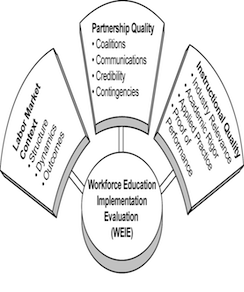To better prepare workers for the jobs of the future, policy makers support partnerships between local businesses and community college workforce education programs, but little is known about the techniques that practitioners use to organize and maintain these efforts. For example, what types of labor market data can inform choices about the high-demand jobs and skills in a region? Based on those data, what degree of collaboration between employers and educators is most feasible for a particular region and industry sector? What factors need to be monitored as the partnership evolves to build the workforce program’s social support network? And, which features of instructional materials and methods build basic technical knowledge and which features develop transferable knowledge and skills to the workplace?
Researchers in the Education Division of SRI International, a nonprofit research and development firm based in Menlo Park, CA, have just completed a 6-year NSF research project into employer-college workforce education partnerships and curriculum. By combining research expertise from labor market analysis, educational policy, and the learning sciences, SRI developed the Workforce Education Implementation Evaluation (WEIE) framework, a set of concepts and tools that help to track the “hard to measure” processes that go into developing these partnerships and instructional programs. Instead of just focusing on productivity metrics like how many materials were developed and how many students were enrolled or certified, these tools help researchers, evaluators, and practitioners understand—and improve—the practices of workforce education partnership. It also sets forth some concrete descriptions of workforce instructional program features in the workforce preparedness quality continuum.
Louise Yarnall is a senior researcher in the Education Division’s Center for Technology in Learning in SRI International’s Menlo Park, CA, office. A design and performance evaluation expert around adult learning, Dr. Yarnall has consulted with workforce educators in multiple technical fields and settings around the design of both problem-based learning activities and assessments of core conceptual knowledge and success skills, such as teamwork and communication skills. She collaborates with engineering teams in SRI’s vision technologies and artificial intelligence centers to design, develop, and test next-generation tools for workforce and military learning and training. She holds a doctorate in education from UCLA.
